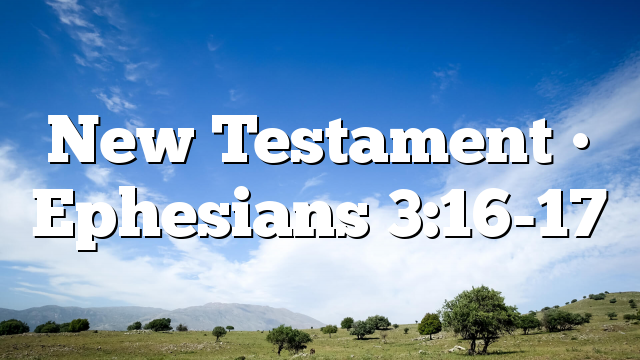Author: ProBible Page 21 / 33
1 John 2:6
καθὼς is correlative to the deictic adverb οὕτως which somewhat clumsily follows it, instead of preceding it. A more natural rendering would be as follows:
ὁ λέγων ἐν αὐτῷ μένειν ὀφείλει οὕτως, καθὼς ἐκεῖνος περιεπάτησεν, καὶ αὐτὸς [οὕτως] περιπατεῖν.
He who says that he abides in him should thus, as he walked, also himself walk.
Statistics: Posted by Robert Crowe — November 15th, 2016, 10:49 pm
Luke 20:18
Another way of saying that is to say the Greek reads a lot more gently than the glosses allow for.
Statistics: Posted by Stephen Hughes — December 23rd, 2016, 1:06 pm
John 17:5
cwconrad asked, “Am I alone in finding the position of παρὰ σοί here strange?” Information available at, inter alia, newadvent.org, indicates you’re not alone.
In several English translations of patristic allusions related to John 17:5, Irenaeus, Novatian, and Origen put παρὰ σοί in front of πρὸ τοῦ τὸν κόσμον εἶναι. Also, Ignatius omitted παρὰ σοί, and Hippolytus left out the phrase πρὸ τοῦ τὸν κόσμον εἶναι παρὰ σοί.
Statistics: Posted by Pat Ferguson — March 8th, 2014, 6:54 pm
Luke 11:36
An Exegetical Analysis of Luke 11:36: The Wholly Illuminated Body This exegetical study of ‘An Exegetical Analysis of Luke 11:36: The Wholly Illuminated Body’ is based on a b-greek discussion from 1881. The discussion presents various critical editions of Luke 11:36, including Nestle 1904, Westcott and Hort 1881, Byzantine Majority Text 2005, Greek Orthodox Church…
Mark 3:1
Wes Wood wrote:
Thanks for the responses the indirect question makes perfect sense. And the second part I don’t have a problem with either. I am meaning authorial foreshadowing inside the pericope, however. Nothing more than the author tipping his hand to what is going to happen in the narrative.
It’s a completely ordinary phrase as Timothy pointed out. It is easy to find its usage as simply “arise” in places like Mat 2:13, 9:19 26:46, Mark 10:49 14:42,. It clearly implies rising from a settled position, but nothing more. In fact, Luke 6:8 makes very clear what “εγειρε”/”εγειραι” in Mark 3:3 means.
Statistics: Posted by David Lim — June 17th, 2014, 7:18 am
John 12:29
Stephen Carlson wrote:
OK. Having checked now Brown commentary, such an appendix was not to be. (There was one on Johannine vocabulary, though, and his use of synonyms.).
It’s been years since I looked at that. I do remember the appendix on Johannine vocabulary, but I also remember a discussion of Johannine use of the perfect; it may have been within the commentary itself with regard to some particular interesting usage of perfect tense.
Statistics: Posted by cwconrad — May 9th, 2014, 7:54 am
Matthew 1:18
Doug Dinnsen wrote:
τῆς μητρὸς αὐτοῦ Μαρίας in Mat 1.18Since Mary was just mentioned in verse 16, the article here could be understood as an article of previous reference, “His [previously-mentioned] mother Mary”.
Wouldn’t that argument work better if Μαρίας had the article rather than μητρός?
Statistics: Posted by Stephen Carlson — September 9th, 2016, 11:15 pm
2 Thessalonians 3:11
Robert Crowe wrote:
There is a remarkable contradiction here with the Hindu ideal, where doing nothing is promoted as a way of attaining nirvana. “When we are doing something, we are only ever doing one thing; but when we’re doing nothing, we are doing absolutely nothing.”
cwconrad wrote:
In a slightly different context, I think of Cicero’s claim that he’s always felt he should be engaged in some megotium or else in some “honorable” form of otium (I think that’s the opening of De Oratore) “Leisure” is too easily associated with “laziness” or moral weakness, “idleness” — “the devil’s workshop.” The final stanza of Catullus’ recreation of Sappho’s grand litany of erotic envy sermonizes about the same “devil’s workshop” otium, μηδὲν ἐργάζεσθαι:Catullus 5 wrote:otium, Catulle, tibi molestumest;
olio exsultas nimiumque gestis.
otium reges pries et beatas
perdidit urbesThat’s impossible to do justice to; it’s something like, “Your problem, Catullus, is having nothing to do; you’re overindulging, bloated on idleness; having nothing to do has been the ruination of monarchs and civilizations.”
If Standard Average European (SAE) was a reference to a Kulturbund rather than a Sprachbund, we would be able see quite clearly at least from the above statements that Ancient India was not part of the region. ![]()
The area covered by the Roman Empire politically, and the area influenced by Roman culture continues to foster the values of Roman society and civilisation, and those value seem familiar to us. In other words, it seems that the authour if 2 Thessalonians was working with a recognised sentiment, rather than introducing a wholly novel concept.
Statistics: Posted by Stephen Hughes — August 16th, 2016, 12:30 am
Romans 4:11
The relevant text: καὶ σημεῖον ἔλαβεν περιτομῆς, σφραγῖδα τῆς δικαιοσύνης τῆς πίστεως τῆς ἐν τῇ ἀκροβυστίᾳ, εἰς τὸ εἶναι αὐτὸν πατέρα πάντων τῶν πιστευόντων δι’ ἀκροβυστίας, εἰς τὸ λογισθῆναι [καὶ] αὐτοῖς [τὴν] δικαιοσύνην,
My question concerns the last prepositional phrase εἰς τὸ λογισθῆναι [καὶ] αὐτοῖς [τὴν] δικαιοσύνην, The first prepositional phrase used the same construction, the preposition eis with the articular infinitive. The first phrase would seem to express the purpose of God in making Abraham the father of all who believe. Should the second phrase be understood as purpose or result, or is there some overlap in the two? Should the second phrase be applied to all those who believe, or should it be construed as the first phrase with the purpose of God. If the former, unbelievers would want to believe (one supposes) for the purpose of being imputed righteousness, but the fact that they do believe indicates that as a result they are imputed righteousness.
Thanks in advance,
Statistics: Posted by ronsnider1 — July 16th, 2014, 12:04 pm
Philippians- 3:13
I think that the difference between λανθάνω and ἐπιλανθάνομαι is similar to the difference between ποθέω and ἐπιποθέω
Statistics: Posted by Stephen Hughes — May 17th, 2017, 10:58 am
Ephesians 3:16
Paul uses many parenthetical statements, especially in Ephesians. How does one determine when a parenthesis begins and ends? Also, regarding Eph.3:16-17, does it not seem that ινα δωη υμιν κατα τον πλουτον της δοξης αυτου δυναμει κραταιωθηναι δια του πνευματος αυτου εις τον εσω ανθρωπον kατοικησαι τον χριστον δια της πιστεως εν ταις καρδιαις υμων is a parenthetical within a parenthetical? Thanks.
Statistics: Posted by dpost1254 — March 15th, 2017, 4:16 pm
Luke 21:21
Stephen Hughes wrote:
εἰς τὸ μέσον means “and become the middle”, “so everybody can see you”, i.e. there is a reorientation of direction of the people looking on, a new middle
Perhaps “focus” is a way of expressing a movable middle in English, “He stood up into focus.”, or more wordily expressed, “He stood up for to make himself the centre of everyone’s attention.”
Statistics: Posted by Stephen Hughes — February 1st, 2017, 3:31 am
Matthew 14:7
Interesting enough, but in the context of a discussion on word order, Pennington doesn’t explicitly state which verb the “intervening” indirect object goes with. Either Herod made some grand statement to all around him, “By Jove, mark my words, I wil…
Mark 8:5
The synoptic parallel provides one an opportunity to do that.
Matthew 15:34 wrote:Καὶ λέγει αὐτοῖς ὁ Ἰησοῦς, Πόσους ἄρτους ἔχετε;
Statistics: Posted by Stephen Hughes — September 22nd, 2017, 3:07 pm
Luke 19:7
I’ve been looking at the usage of καταλῦσαι in Luke 19:7 and am a bit stumped why it’s translated as “to be the guest of” (or a variation thereof) instead of to abolish, destroy, dissolve, etc.,
In light of the overall passage, it doesn’t make sense to use a derivative of abolish but I don’t understand either why it deviates so much from the other usages (i.e. Matthew 5:17, 61; Acts 5:39)
Statistics: Posted by Matt Lahey — June 19th, 2017, 6:47 pm
John 5:4
[John 5:4 Byz] αγγελος γαρ κατα καιρον κατεβαινεν εν τη κολυμβηθρα και εταρασσεν το υδωρ ο ουν πρωτος εμβας μετα την ταραχην του υδατος υγιης εγινετο ω δηποτε κατειχετο νοσηματι
What exactly does the imperfect tense of “εγινετο” here mean?
Statistics: Posted by David Lim — June 25th, 2014, 5:27 am
John 1:9
[John 1:9] ην το φως το αληθινον ο φωτιζει παντα ανθρωπον ερχομενον εις τον κοσμον
I’ve always thought that there were only two possibilities:
(1) “το φως το αληθινον ο …” is the subject of the periphrastic “ην ερχομενον …”; “the true light which illuminates every man was coming into the world”
(2) “ερχομενον εις τον κοσμον” adjectivally modifies “παντα ανθρωπον”, and “το φως το αληθινον” is subject of “ην” with predicate as the indefinite relative “ο φωτιζει παντα ανθρωπον”; “the true light was that which illuminates every man who comes into the world”
And I previously thought that (1) was more likely given how it would flow naturally into the next sentence, although (2) could be arguable given John’s liking for using similar words in different places in close proximity with different meanings.
But I happened to look at that verse again today and thought of a third possibility:
(3) “το φως το αληθινον” is subject of “ην” with predicate as the indefinite relative “ο φωτιζει παντα ανθρωπον”, and “ερχομενον εις τον κοσμον” is a circumstantial adverbial modifying “φωτιζει”; “the true light was that which, coming into the world, illuminates every man”
On thinking of that it seemed similar to other occasions of such present tense circumstantial adverbials in John’s writing such as 1:48 (“οντα υπο την συκην ειδον σε”), 4:9 (“πως συ ιουδαιος ων παρ εμου πειν αιτεις γυναικος σαμαριτιδος ουσης”).
So which do you all think is the most likely, if we make the assumption that John isn’t intentionally trying to make an ambiguous sentence? I’m thinking (3) now.
My search turned up only two results:
viewtopic.php?f=46&t=1461, which didn’t clearly identify the grammatical structure, and where there wasn’t really a clear consensus
http://www.ibiblio.org/bgreek/test-arch … 23803.html, where Carl concluded on (1) but didn’t mention (3). Any comments, Carl? ![]()
Statistics: Posted by David Lim — June 25th, 2014, 1:12 am
John 1:1
Ἐν ἀρχῇ ἦν ὁ Λόγος
This is always translated as “In the beginning”, but from the little I
understand of Greek grammar, one shouldn’t append the definite article in
English if the article is absent in Greek.
Is this “hyer-literal” translation accurate:
“In origin was the Word”
http://catholic-resources.org/John/Outl … ologue.htm
ὅτι ἀπ᾽ ἀρχῆς ὁ διάβολος ἁμαρτάνει
“For the devil sins from the beginning.”
The devil has an article, in both Greek and English, but again, beginning
has none.
Apologies for a simplistic question, I’m only two words into the text and
I’m confused.
Can someone clear this up for me?
Danny Diskin
Statistics: Posted by Danny Diskin — April 14th, 2014, 10:40 pm
Revelation 2:13
S Walch wrote: ↑November 23rd, 2017, 6:33 amGood quick rundown there, Stirling. Just a few quick mistakes for you to rectify:Rev 10:1: you’ve not bolded the definite articles before κεφαλὴν/ςRev 11:3: In SBLG you’ve bolded προφητεύσουσιν instead of πε…



















![New Testament • Re: Rev 2:13 ο μαρτυς μου, ο πιστος [μου]?](https://probible.net/wp-content/uploads/2017/11/New-Testament--Re-Rev-213-ο-μαρτυς-μου-ο-πιστος-μου8.png)